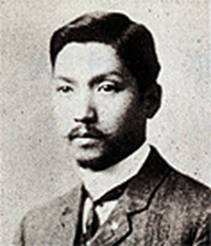Sakae Osugi
| Ōsugi Sakae | |
|---|---|

(1885–1923)
|
|
| Born |
January 17, 1885 Marugame, Japan |
| Died | September 16, 1923 (aged 38) Tokyo, Japan |
Sakae Ōsugi (大杉 栄 Ōsugi Sakae?, January 17, 1885 – September 16, 1923) was a radical Japanese anarchist. He published numerous anarchist periodicals, helped translate western anarchist essays into Japanese for the first time, and created Japan's first Esperanto school in 1906. He, Noe Itō, and his nephew were murdered in what became known as the Amakasu Incident.
Sakae Ōsugi was born on January 17, 1885 in Marugame, Kagawa, according to his autobiography, Jijōden. The Ōsugi family registry misrepresents his date of birth by several months, leading to some confusion in other reports. He was the eldest son of Kusui Yutaka and Japanese military captain Ōsugi Azuma. Little is known of his siblings except for the youngest, Ayame. She was married to Tachibana Sōsaburō and moved to Portland, Oregon; their son Munekazu would be the third victim of the Amakasu Incident in 1923.
In his early teens, Ōsugi enlisted in Cadet School but was a poorly motivated, rebellious student. He was reprimanded often and nearly expelled more than once. On one occasion it was implied that he took part in illicit homosexual behavior with a younger cadet; he was held in the school stockade for 10 days for this and received 30 days of confinement. Later he participated in a knife fight; fighting unarmed, fearing he'd injure his opponent, he received injuries which required a fortnight's hospitalization. After this incident he was finally expelled.
In 1903 he eventually decided to attain higher education in French Literature at the Tokyo School of Foreign Languages (the present-day Tokyo University of Foreign Studies), with the encouragement of a childhood friend, Rei, advice from an associate of his father, Lieutenant Morioka, and the blessings of his parents. While in school he experienced independent living for the first time and began associations that would last years and lead to his experimental phase in Christianity and socialism. He graduated from the school in 1905.
...
Wikipedia
